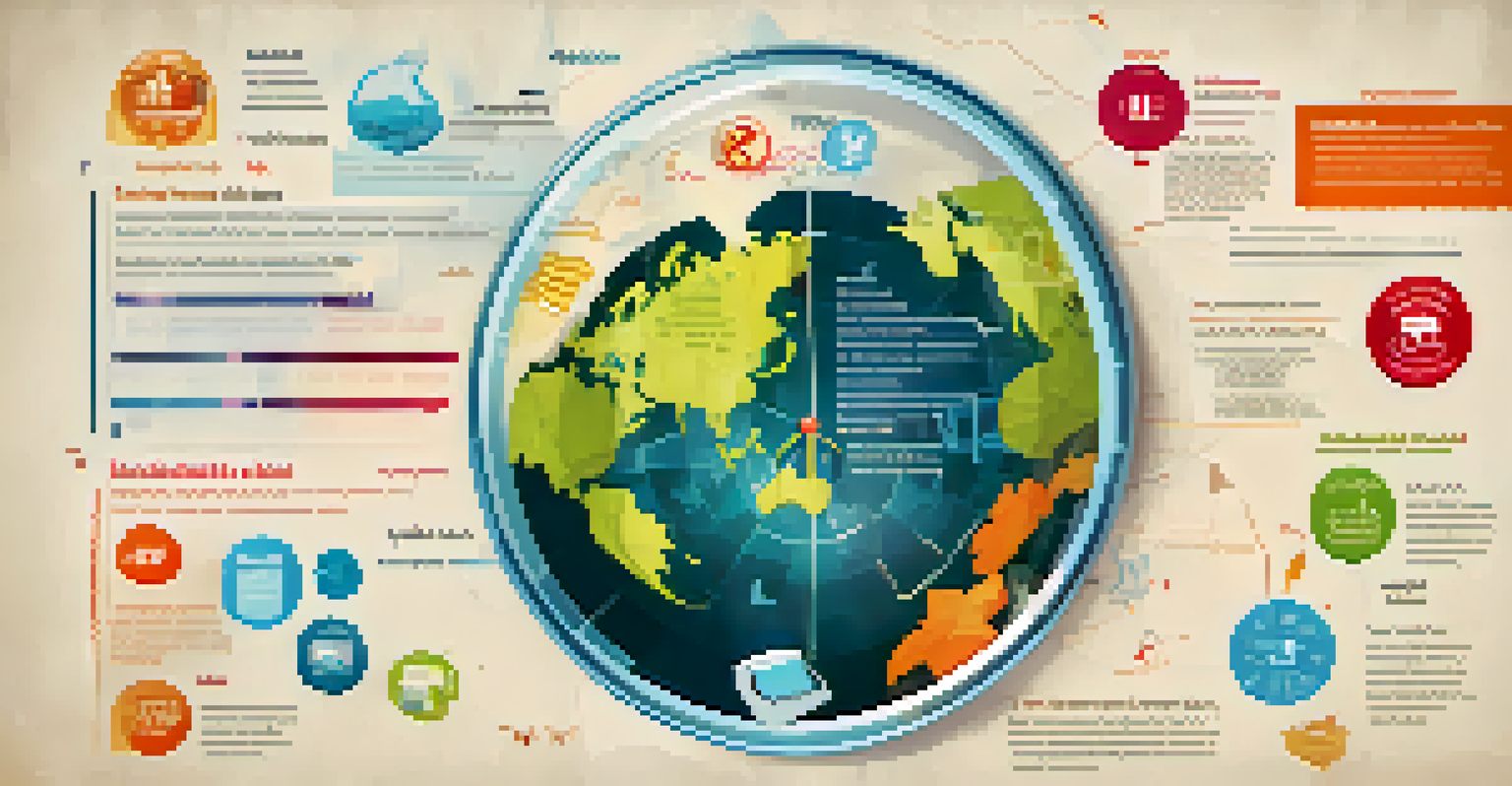The Role of Epidemiology in Disease Prevention Strategies

What is Epidemiology and Why is it Important?
Epidemiology is the study of how diseases affect the health and illness of populations. It helps us understand the patterns, causes, and effects of health and disease conditions in specific groups. By identifying risk factors and disease distribution, epidemiologists provide crucial insights that inform public health policies.
Epidemiology is the cornerstone of public health, providing the tools and knowledge to prevent disease and promote health in populations.
Think of epidemiology as the detective work of the health world. Just like a detective investigates a crime scene to uncover what happened, epidemiologists analyze data to figure out how diseases spread. This knowledge is vital for preventing outbreaks and protecting communities.
In a nutshell, epidemiology is the backbone of disease prevention strategies. Its findings guide not just individual health decisions but also community-wide interventions aimed at reducing the likelihood of illness.
Key Epidemiological Methods Used in Disease Prevention
Epidemiologists employ various methods to collect and analyze data, including surveys, observational studies, and clinical trials. These techniques help identify trends and correlations that can be crucial in formulating effective prevention strategies. By understanding how diseases spread, public health officials can implement targeted interventions.

For example, during an outbreak of a contagious disease, epidemiologists might trace contacts of infected individuals to prevent further spread. This proactive approach not only helps contain the outbreak but also provides a clearer picture of the disease's transmission dynamics.
Epidemiology: Disease Prevention Backbone
Epidemiology provides essential insights into disease patterns and risk factors, guiding public health strategies and interventions.
Ultimately, these methods empower health authorities to make informed decisions. With accurate data in hand, they can allocate resources effectively and develop policies that minimize the risk of disease transmission in communities.
The Role of Data Analysis in Epidemiology
Data analysis is at the heart of epidemiological research, enabling scientists to interpret complex health information. By employing statistical techniques, epidemiologists can identify patterns and relationships that might not be immediately apparent. This analysis is essential for understanding the effectiveness of prevention efforts.
In the face of a pandemic, data is our most powerful weapon, guiding our actions and informing our strategies.
For instance, during the COVID-19 pandemic, data analysis was crucial in determining which populations were most at risk and how the virus spread. This information guided public health recommendations, such as mask-wearing and social distancing, helping to flatten the curve.
In short, data analysis transforms raw information into actionable insights. It equips health professionals with the knowledge needed to devise strategies that effectively combat diseases.
How Epidemiology Informs Vaccination Strategies
Vaccination is one of the most effective tools for disease prevention, and epidemiology plays a pivotal role in its development and implementation. By studying the incidence and prevalence of diseases, epidemiologists can determine which vaccines are needed and in which populations. This targeted approach maximizes the impact of vaccination campaigns.
Consider the case of measles; epidemiologists track outbreaks to identify areas with low vaccination rates. By focusing efforts on these regions, public health officials can increase immunization coverage and protect vulnerable populations.
Data Analysis Drives Health Insights
Through statistical techniques, data analysis in epidemiology reveals complex health information, enabling effective prevention strategies.
Ultimately, epidemiology ensures that vaccination strategies are not only effective but also equitable. It helps to ensure that those at greatest risk receive timely protection against preventable diseases.
Epidemiology's Role in Chronic Disease Prevention
While often associated with infectious diseases, epidemiology is also crucial in preventing chronic diseases such as diabetes and heart disease. By identifying risk factors such as poor diet, lack of exercise, and smoking, epidemiologists help shape public health initiatives aimed at reducing these risks.
For example, through community-based studies, epidemiologists can assess the effectiveness of programs promoting physical activity and healthy eating. This evidence-based approach allows for targeted interventions that address specific health challenges within communities.
In essence, epidemiology provides the framework for understanding and preventing chronic diseases. It allows health officials to implement strategies that promote long-term health and well-being.
The Impact of Social Determinants on Epidemiology
Social determinants of health, such as socioeconomic status, education, and access to healthcare, significantly influence disease patterns. Epidemiology examines how these factors affect health outcomes and can help identify vulnerable populations. Understanding these social determinants is essential for crafting effective prevention strategies.
For instance, if an epidemiological study finds that low-income neighborhoods have higher rates of obesity, public health initiatives can be tailored to address these disparities. This might include increasing access to healthy food options or creating safe spaces for physical activity.
Social Determinants Shape Health Outcomes
Understanding social determinants of health is crucial for developing comprehensive prevention strategies that address disparities in communities.
By considering social determinants, epidemiology ensures that prevention strategies are comprehensive and address the root causes of health disparities. This holistic approach leads to healthier communities overall.
Epidemiology and Global Health Initiatives
Epidemiology plays a vital role in global health initiatives, particularly in combating infectious diseases that transcend borders. By sharing data and collaborating internationally, epidemiologists can track disease outbreaks and develop coordinated responses. This global perspective is crucial in a world where diseases can spread rapidly.
For example, the World Health Organization (WHO) relies on epidemiological data to guide its global health strategies. During outbreaks like Ebola or Zika, timely data collection and analysis can make a significant difference in controlling the spread.

In a nutshell, epidemiology fosters international collaboration and knowledge sharing, essential for addressing global health challenges. It empowers nations to work together in preventing disease and promoting health across populations.
Future Trends in Epidemiology and Disease Prevention
As technology continues to evolve, so does the field of epidemiology. Innovations like big data analytics, artificial intelligence, and wearable health technology are transforming how epidemiologists collect and analyze data. These advancements hold great promise for improving disease prevention strategies in the future.
For instance, wearable devices can provide real-time health data, allowing for proactive monitoring of health trends. This can lead to earlier interventions and a better understanding of disease dynamics, ultimately enhancing public health responses.
Looking ahead, the integration of technology into epidemiological practices will likely lead to more personalized and effective disease prevention strategies. As we embrace these innovations, the potential for improving global health outcomes is immense.